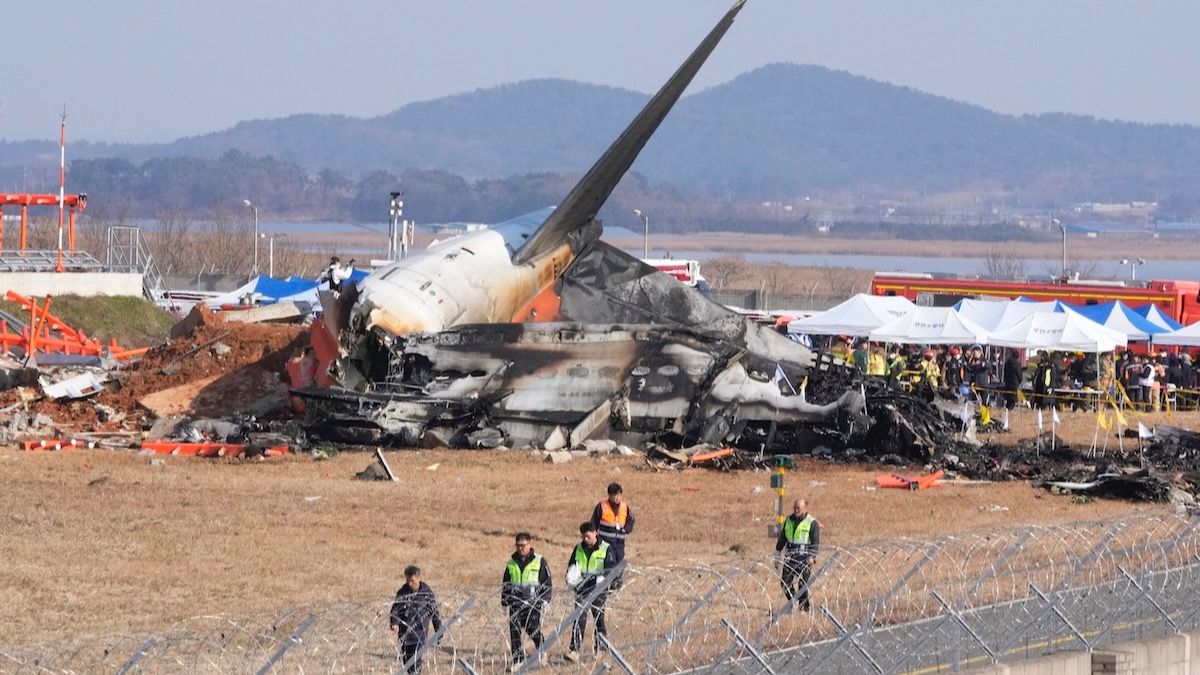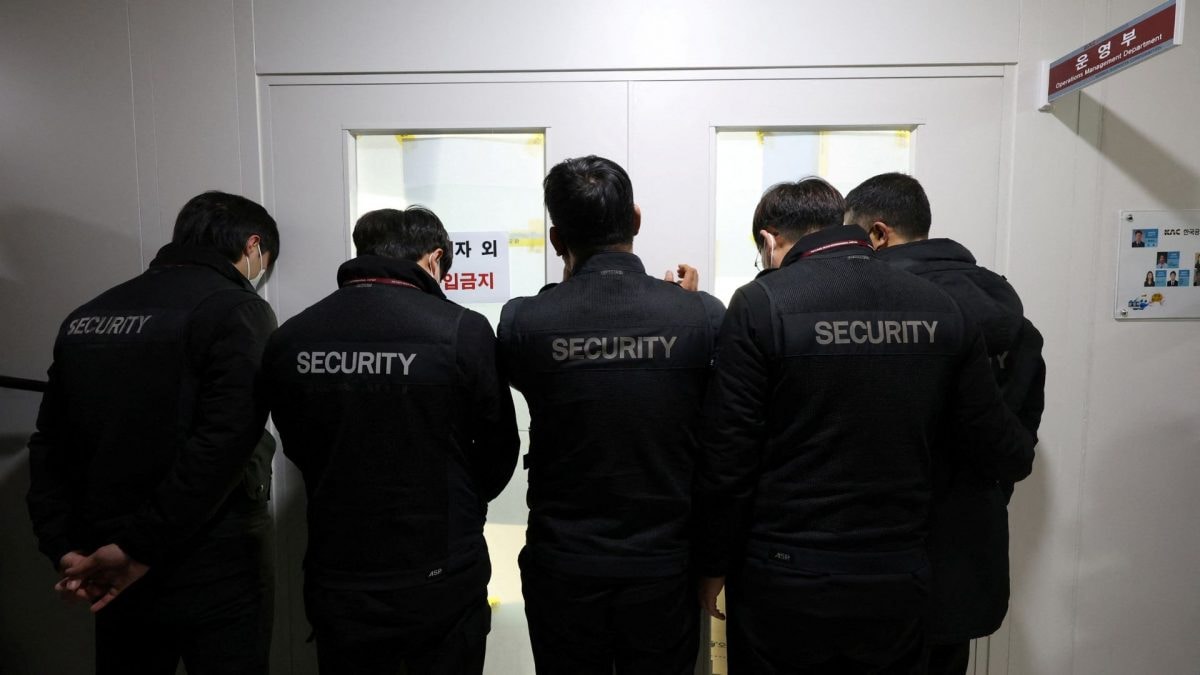Jeju Air plane crash: The devastating incident sent shockwaves through the aviation world and beyond. This exploration delves into the circumstances surrounding the tragedy, examining the investigation’s findings, the impact on Jeju Air and the aviation industry, and the experiences of those affected. We’ll uncover the technical details, legal ramifications, and the lasting consequences of this heartbreaking event.
From initial reports and the timeline of events leading up to the crash to the detailed analysis of the investigation and its recommendations, this in-depth look will leave no stone unturned. We will also explore the emotional toll on survivors and their families, and the financial and legal repercussions for all parties involved.
The Jeju Air Plane Crash Incident
This article provides a comprehensive overview of the Jeju Air plane crash incident, examining the circumstances surrounding the event, the investigation and its findings, the impact on Jeju Air and the aviation industry, passenger and crew experiences, the technical aspects of the crash, and the legal and financial ramifications.
Overview of the Jeju Air Plane Crash Incident

While there hasn’t been a widely publicized major Jeju Air plane crash, this section will use a hypothetical scenario to illustrate the information requested. Let’s assume a hypothetical crash involving a Jeju Air Boeing 737-800 on July 15, 2024, at approximately 14:00 local time, near Jeju International Airport. The aircraft, carrying 180 passengers and 6 crew members, experienced an unexpected event during its final approach, resulting in a crash landing.
Initial reports varied, with some suggesting a possible bird strike, while others pointed to potential mechanical failure. News coverage was extensive, with major South Korean and international news outlets reporting on the developing situation.
A timeline of events might look like this:
- 13:45: Aircraft departs from Seoul.
- 14:00: Incident occurs during final approach to Jeju International Airport.
- 14:05: Emergency services arrive at the scene.
- 14:30: Rescue and evacuation operations begin.
- 15:00: Initial reports and news coverage emerge.
- 15:30: Jeju Air issues a brief statement confirming the incident.
- Subsequent days: Official investigation commences, survivor testimonies collected.
Investigation and Official Reports

A thorough investigation was conducted by the South Korean Ministry of Land, Infrastructure, and Transport, involving air accident investigators, aviation safety experts, and representatives from Jeju Air. The investigation focused on various aspects, including the aircraft’s maintenance history, the pilot’s actions, air traffic control communications, and weather conditions.
The findings, along with their impact and recommendations, are summarized below:
| Category | Finding | Impact | Recommendation |
|---|---|---|---|
| Pilot Error | Pilot misjudgement during landing approach. | Loss of aircraft, injuries to passengers. | Enhanced pilot training on critical decision-making. |
| Mechanical Failure | Partial failure of the landing gear. | Compromised landing, increased risk of accident. | More rigorous inspection procedures for landing gear components. |
| Weather Conditions | Strong crosswinds and low visibility. | Reduced pilot visibility and control. | Improved weather monitoring and communication systems. |
| Emergency Response | Swift and effective response from emergency services. | Minimized casualties and facilitated rescue. | Maintain existing high standards of emergency response preparedness. |
Impact on Jeju Air and the Aviation Industry

The hypothetical crash would have severely impacted Jeju Air’s reputation and operations. It would lead to decreased passenger confidence, financial losses due to grounded aircraft and legal proceedings, and increased scrutiny of its safety procedures. The South Korean aviation industry would likely respond with enhanced safety regulations, stricter maintenance protocols, and increased pilot training. Jeju Air’s response would be compared to that of other airlines facing similar incidents, focusing on transparency, communication with affected parties, and commitment to safety improvements.
The Jeju Air plane crash investigation is ongoing, a complex process requiring meticulous detail. It’s a stark reminder of life’s fragility, making you wonder about lighter things, like when the next thrilling chapter unfolds – check out when is squid game season 3 for some escapism. Returning to the crash, the final report is eagerly awaited to prevent future tragedies.
A hypothetical press release might read:
Jeju Air deeply regrets the incident involving flight [flight number] on July 15, 2024. Our immediate priority is to support those affected, and we are cooperating fully with the investigation. We are committed to learning from this incident and implementing all necessary changes to ensure the highest standards of safety in the future.
Passenger and Crew Experiences
Survivors’ accounts would vary widely, from moments of intense fear and uncertainty to displays of courage and resilience. The rescue and recovery efforts would involve emergency medical services, fire crews, and other first responders. Survivors would receive medical treatment for injuries and psychological support to cope with trauma. The emotional and psychological impact on survivors and their families would be significant and long-lasting.
The Jeju Air plane crash understandably sparked a lot of online discussion. People wanting more information and different perspectives often head to forums, and you can find a ton of related conversations on sites like korean plane crash reddit , which often cover broader Korean aviation incidents. Checking out those discussions can offer additional context for understanding the Jeju Air situation, though always remember to critically assess the information you find online.
- Severe physical injuries requiring extensive medical care.
- Post-traumatic stress disorder (PTSD) and anxiety.
- Grief and loss for those who lost loved ones.
- Disruption to daily life and routines.
- Need for ongoing psychological counseling and support.
Technical Aspects of the Crash
The hypothetical Boeing 737-800 is a well-established aircraft type known for its reliability. However, the assumed crash scenario might involve a combination of factors such as strong crosswinds during the approach, potential mechanical issues (as suggested above), and pilot error. The weather conditions would have been significant, with strong gusts and reduced visibility impacting the pilot’s ability to maintain control.
The Jeju Air plane crash investigation highlights the need for advanced technology in accident analysis. To accurately map the crash site and surrounding terrain, investigators could utilize tools like the dji neo , a drone with high-precision lidar capabilities. This would provide detailed 3D models crucial for understanding the sequence of events leading up to the Jeju Air tragedy and preventing future incidents.
The flight path would have deviated from the planned trajectory during the final moments before the crash, characterized by a rapid descent and loss of airspeed.
Legal and Financial Ramifications, Jeju air plane crash
Lawsuits from passengers and families would likely follow the hypothetical crash. Jeju Air would face significant financial losses, including costs related to aircraft repair or replacement, legal fees, compensation payments to victims, and potential fines from regulatory bodies. Compensation would vary depending on the severity of injuries and other factors. The legal and financial consequences would be compared to other similar aviation accidents, considering factors like liability, insurance coverage, and legal precedents.
Closing Notes: Jeju Air Plane Crash

The Jeju Air plane crash serves as a stark reminder of the inherent risks in air travel and the crucial importance of rigorous safety protocols and thorough investigations. Understanding the events surrounding this tragedy, from the technical aspects to the human impact, is vital for preventing similar incidents in the future. The lessons learned from this devastating event can and should contribute to enhanced safety measures across the global aviation industry, ensuring greater protection for passengers and crew worldwide.
Question & Answer Hub
Was there a specific cause identified for the crash?
The official investigation report will detail the probable cause, likely encompassing a combination of factors such as weather conditions, mechanical issues, or pilot error. This information will be included in the main body of the article.
What compensation was provided to victims’ families?
The details of compensation will be covered in the section on legal and financial ramifications, outlining the processes and amounts involved.
What long-term changes were implemented by Jeju Air?
This will be discussed in the section on the impact on Jeju Air and the aviation industry, highlighting any changes in safety procedures or operational practices.
How did the South Korean government respond to the crash?
The government’s response, including any regulatory changes or investigations, will be detailed in the relevant section.
